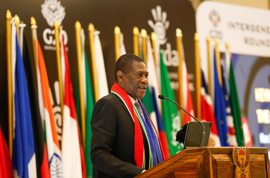
South Africa has taken a significant step in fostering inclusive growth by officially ratified the Protocol Women and Youth in Trade under the African Continental Free Trade Area.
This was announced by Deputy President Paul Mashatile, who addressed the High-Level G20 Intergenerational Roundtable, hosted by the National Youth Development Agency (NYDA) on Friday.
“This milestone is not just a symbolic gesture; it is a decisive policy action that signals our intent to mainstream gender and youth equity within intra-African trade policy.
“The protocol is significant because it operationalises the inclusion of woman-led and youth-led enterprises in regional and global value chains. It mandates the removal of structural trade barriers, prioritises access to information, finances, and markets, as well as requires state parties to create enabling legal and policy environments for inclusive economic participation,” he said.
The Deputy President reflected on the continent’s youthful population and noted that youth “remain on the margins of formal trade”.
Therefore, the protocol on women and youth will assist to “rewire trade systems to reflect demographic and developmental realities”.
“South Africa’s ratification means we are committed not only to advocating for inclusive trade but also to designing trade systems that are fit for purpose. This inclusion reinforces South Africa’s leadership role on the continent and supports the broader message of building youth capabilities for a developmental State.
“We understand that we need young people to meaningfully build capable, ethical, and developmental states. We must integrate youth into national and continental planning frameworks, not just as beneficiaries but also as co-architects of development,” he said.
Promoting inclusive growth
Mashatile emphasised that a “functioning and competent” government is needed if youth are to break free from marginalisation.
“Therefore, the first and most pressing priority of our government is the promotion of inclusive economic growth, industrialisation, employment, and reducing inequality.
“The time has come for us to move beyond inclusion as a moral goal and make it a measurable outcome.
“In this regard, it is important for the economy to strengthen the viable pathways for youth inclusion. We have noted that young people complain about the red tape and bureaucratic hurdles they need to overcome to access services designed to support and scale their entrepreneurial effort,” Mashatile said.
He noted that a specialised unit has been established in the Presidency to address the business climate and address regulatory challenges.
“This team is adopting a coordinated, cross-sectoral approach, engaging various government departments and entities to streamline processes and enable business growth.
“Key interventions in this regard will target the removal of administrative bottlenecks in strategic sectors. These include improvements to the mining licensing framework, facilitation of tourism transport permits, and streamlining of visa and work permit processes, as well as regulatory support for early childhood development services and the informal economy,” Mashatile said.
Furthermore, government will:
- Anchor youth inclusion in every major pillar of our G20 Presidency, from climate finance and trade facilitation to digital transformation and skills mobility.
- Institutionalise intergenerational co-leadership in governance frameworks, moving beyond consultation to shared power and shared design.
- Work with regional and global partners to implement targeted reforms that enable young people to start businesses, access capital, and engage in cross-border trade.
“The developmental State we seek to build is not a theoretical construct; it must be a living architecture built on the capabilities, aspirations, and contributions of its young people.
“This roundtable has made one thing clear: youth are not merely beneficiaries of policy; they are builders of nations. We must now ensure that the decisions we take at multilateral forums reflect this truth.
“Let the G20 remember that Africa is young. South Africa is ready, and we want young people to take the lead in the developmental and transformation agenda. The future is yours, and you are the future. Stand up, persevere, and confront every challenge with persistence. We are here to provide you with the support you need as you navigate this process,” the Deputy President concluded. – SAnews.gov.za


